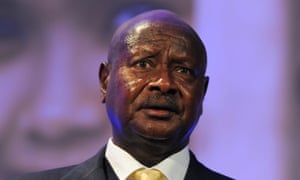For decades, activists in Uganda called for manageable family sizes. At the same time, President Yoweri Museveni talked up the benefits of a large population to make the country more attractive to investors. Something had to give, and the London family planning summit in 2012 appeared to mark a turning point.
There, Museveni not only articulated the benefits of family planning but also committed money to it, increasing government funding from $ 3.3m (£250m) to $ 5m annually for five years. He also announced plans to mobilise $ 10m from donors and streamline Uganda’s medical supply systems to improve delivery of family planning commodities.
Four years on, how has Museveni performed?
Related: Critical moment for family planning as funds come under pressure
Dr Jotham Musinguzi, the director general of the National Population Council, believes Uganda is on the right track. As evidence, he highlights Museveni’s recent exhortation to Ugandans – made in a speech to mark World Population Day – to be cautious about producing children if they lack the capacity to look after them.
“There is now a sharpened plan, together with a costed implementation plan for family planning, and in July 2014 [Museveni] launched the demographic dividend report for Uganda, in which family planning is fully embedded as a policy framework,” says Musinguzi, who formerly headed both the National Population Secretariat and Partners in Population and Development Africa(PPDA).
Yet, when it comes to funding, the picture is blurred. Dr Placid Mehayo, a consultant to the health ministry family planning, says there has been more money available since the London summit. Patrick Mugirwa, a Ugandan reproductive health expert, agrees the meeting provided a financial boost, but argues that government commitments are still dependent on donor funding.
Mugirwa notes that, in the financial year following the summit, spending on reproductive health commodities tripled, from 8bn Ugandan shillings (£1.8m) to 24.8bn, before rising to 25.7bn in 2014-15. He attributes these increases largely to the World Bank-funded health systems strengthening project, which had a component on procuring reproductive health commodities.

His thesis is supported by the fact that in 2015-16, as the project funding dried up, government support for the purchase of commodities fell to 8bn shillings, barely half the amount pledged in London. Figures for 2016-17 are unavailable, but Mugirwa believes there has been little change since.
Neither are these the only challenges undermining family planning in Uganda, according to experts.
“The problem in Uganda is the implementation on the ground,” says Musinguzi. “Although family planning is increasing in Uganda, it is increasing at a slow rate that is not like in Kenya, Rwanda, Ethiopia.”
Besides persistent stock-outs, fears of side effects, and religious and cultural factors, family planning uptake is also held back by a “weak health system with the perennial challenges of inadequate and less motivated human resources for health”, argues Mugirwa.
Mehayo agrees. “First, you have few midwives and if there is a delivery, the few who are there have to prioritise that, and may not have enough time for counselling on family planning,” he says.
Mehayo acknowledges that the ministry of health has applied for a loan and grant of about $ 140m from the World Bank to improve infrastructure and purchase family planning commodities, but points out the project would not start until after July 2017.
Uganda has committed to improving the management of drugs supply chains, and the National Medical Stores now publishes delivery schedules to show that it is efficient and accountable. But health centres work with slim budgets and stock-outs are common.
That government allocation for reproductive health commodities rose when there was donor money available is significant. The question now is whether the government would prioritise family planning if donor money dwindled.
Musinguzi believes that, now Museveni appreciates the demographic dividend, the government would find the money. He has not been alone in warning the government that, when Uganda starts exporting oil in five or six years’ time, donors will start directing their money towards other countries.
“The long-term vision is that the country must make sure that there is voluntary family planning available so that it can build a labour force through the demographic dividend,” Musinguzi says.
Has Yoweri Museveni walked the talk on funding family planning in Uganda? | Richard M Kavuma
Hiç yorum yok:
Yorum Gönder